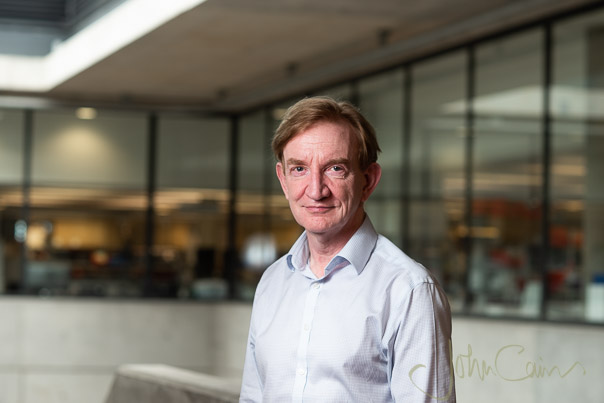With this week’s announcement that the World Health Organization (WHO) approved a second vaccine, R21, for the prevention of malaria in children, Malaria No More sat down for an interview with the chief investigator of the R21/Matrix-M malaria vaccine program, Professor Adrian Hill of the Jenner Institute at Oxford University. In this feature, Professor Hill shares his thoughts on what makes this 2nd malaria vaccine a “game-changer” in the malaria fight, how R21 compares to RTS,S (the first malaria vaccine) and his personal story on why he chose to invest 30 years of his career in malaria research.

Courtesy: Photographer John Cairns
As the lead scientist working on the development of R21 – and on malaria vaccine development, in general, for 30 years – can you tell us about the process of getting to this historic moment where we now have a 2nd malaria vaccine approved by the WHO?
HILL: Most of that time has been spent finding a malaria vaccine that's good enough to deploy… Obviously this has been a tough nut to crack… It has required very, very strong immune responses, very high antibody levels… [WHO] agreed that [R21] looked very suitable and approved it for children over five months of age…. This is a very important approval from WHO…. This vaccine is going to low-income countries, particularly to children in the countries… and we hope, hundreds of millions [of doses] per year… to some of the lowest income countries in Africa free of charge… It's great to finally have a licensed or approved vaccine.
How does R21 compare to the world’s first malaria vaccine, RTS,S?
HILL: These are similar-ish vaccines, in terms of their overall antigen content and structure… they differ in terms of supply, in terms of cost, and in the details of how they perform, in terms of being very protective…The biggest advantage is you can have it…There will be about 100 million to 200 million doses next year….There will possibly be 6 to 8 million of RTS,S. And when you remember, each shot requires four doses, 6 to 8 million isn't enough for 40 million children who need the malaria vaccine in Africa. So that's the biggest advantage. The second advantage is the price will be… something like a third of RTS,S… about $10. We should be [with R21], closer to the three-and-a-half-dollar range. And it seems to work better in standard deployments in young children…So this is good news that we have inexpensive vaccine giving pretty high efficacy.
R21 is being touted as a “game-changer” in the malaria fight? Is that fair?
HILL: Lots of countries…don't have enough vaccine. And now with R21, they won't have that problem, because it's possible to manufacture more than you need.
What do you expect to be the timeline for distributing R21?
HILL: We were hoping it would be in the next month or two… There are millions of doses sitting in a fridge in India…The company in India wants to distribute those doses. I want them distributed. We know most African countries want them distributed and lots more.
How did you get into malaria work?
HILL: Personal experience of seeing children die of malaria. I went to Zimbabwe in the very late seventies, where my uncle had been a missionary for decades and was a medical student in the hospital…The wards were full of tropical infectious diseases, mainly malaria. Later on…I worked as a junior doctor in a hospital in Gambia, where during the malaria seasons… you would have three children to a bed sitting in some extremely anemic meat eating transfusion, and very, very few trained medical staff, particularly in the evenings. It was just… horrendous… It's taken a couple of decades to get vaccines to where they are today.
What do you consider to be ‘next steps’ for the malaria fight?
HILL: For seven years, we haven't really reduced the number of deaths from malaria…We knocked it down a lot from 2000 to 2015, but the numbers for last year…were essentially the same as they were seven years ago. So that's why I think new tools are really important. We mustn't stop using the old tools…. But there are a whole range of technologies.
When we talk about ending malaria in this generation, is that aspiration realistic in your opinion?
HILL: I hope so, because I'm one of those people… But to be clear, we're going to knock down the number of deaths first…Then, once you've got mortality down from the horrendous figure of a thousand children dying that day in Africa alone to, you know, 1/10 of that, ideally then you can get really serious about elimination because new vaccines will come along and prevent transmission and allow you to take a whole region and vaccinate everybody, children, and eliminate malaria there….We should be able to do this by 2040.
###


